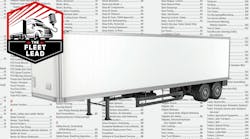Breaking down silos and selecting the right partners for meaningful impact
Successful collaborations are built on information sharing and working together to find the best possible solution. In the case of AFPG, one of the goals is to break down silos between freight modes, sectors, and technologies. Siloed information is a big impediment to finding practical solutions.
It’s not just about having information, it’s about having the right information—and that's why it's important to select the right partners to collaborate with. I think AFPG did a decent job of finding partners across a broad spectrum. The initial group of partners includes OEMs, utilities, infrastructure providers, port authorities, organizations that represent the maritime industry, and several NGOs.
An AFPG press release says, “The AFPG will develop and implement practical and scalable strategies—both operational and policy-driven—to accelerate the deployment of innovative technologies that modernize the future of freight movement and commercial delivery. The group will also elevate best practices and highlight projects around the country that demonstrate success.”
While that sounds like a big goal, I think that with so many people working on it collaboratively, we will get much closer to making it a reality than if each of the groups involved worked on it separately. And that’s how you know you've picked the right people to collaborate with, because the end results will improve the entire transportation system, not just a small portion of it.



